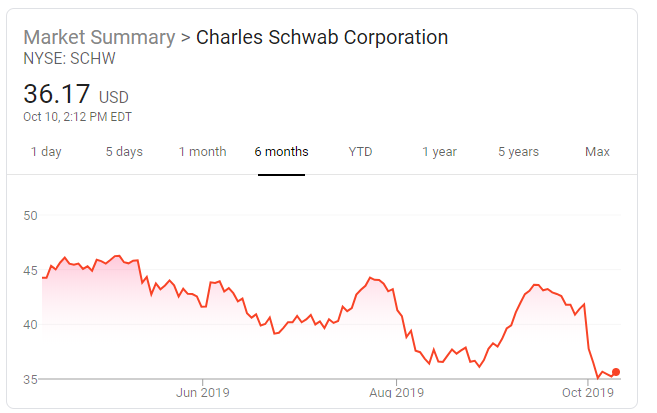
Although the equity market had a quick and violent negative reaction to the news that Charles Schwab (SCHW) would be proactive in driving online trading commissions down to zero for the bulk of the industry, I actually think the move was aggressive, made from a point of strength, and does not hinder their ability to grow from here.
Much was made in the press that SCHW had to do this to avoid losing material share to upstarts like Robinhood, but that view ignores the fact that Schwab's core business is not to provide young people with relatively low account balances a limited set of free services. Simply put, as the world's largest custodian for RIAs, the Schwab and Robinhood customer bases don't typically overlap much.
What Schwab was able to do was distance itself further from other traditional online brokerage firms like E*Trade and TD Ameritrade, which get a much larger portion of their revenue (25-35%) from trading commissions than Schwab does (less than 5%). Peers have had to quickly match the zero price point and will now have to reevaluate their business models after losing a huge portion of their revenue. Schwab, meanwhile, can easily withstand a 3-4% hit to revenue and will continue to focus on their core business of asset gathering.
Interestingly, Schwab stock has fallen 15% on the prospect of losing less than 5% of their revenue by moving to free online trading:

The narrative has been that this puts the company now much more in the "bank" category, as it will need to rely even more on net interest income to generate profits. As such, with interest rates falling and the yield curve flattening, the near-term outlook for their business is muted and investors should value the shares accordingly.
While I think that view is likely to be correct near-term, I don't think it alters the chances that Schwab can continue to be a dominant franchise in their category and grow nicely in the future. If one looks out 3-5 years or longer, there are few peers who can match their service offerings and I doubt they will stop making bold moves when opportunities arise. However, the stock price today is hardly reflective of that after the latest sell-off.
In recent years, SCHW has traded for around 30 times annual earnings, likely due to their standing as one of the most dominating franchises for investing. From 2013 to 2017, the stock ended each calendar year in a relatively narrow valuation band between a 30x to 32x P/E ratio. This also equated to a price-to-book ratio between 3.2x and 3.8x (ROEs of 10-12%).
Given a more interest rate sensitive business model recently and a slowing economy since the one-time jolt we saw from the tax cuts in early 2018, we definitely should expect that valuation to contract. In fact, today SCHW shares fetch just 13.8x 2019 forecasted earnings and 2.3x book value (despite ROEs now around 16% thanks to lower tax rates).
So what is the "right" valuation for Schwab? Should we simply treat it like any other large bank, such as Bank of America and JP Morgan, which both trade for 11x earnings?
Schwab's profitability ratios suggest to me it should trade at a premium, with returns on equity of 16% in 2018 and earnings set to grow 6% this year. At a 15x P/E ratio, still a discount to the market, we would project a fair value of 2.4x book value. That would put the stock today at an 8% discount to fair value, which is a pretty good price considering that Schwab's future growth outlook is unlikely to be stunted.
Just how can a business with the size and scope of Schwab grow from here? Well, total company revenue has doubled between 2013 and 2019 despite near-record low interest rates for the bulk of that time period. That kind of growth cannot be matched by large traditional banks. If Schwab continues to maintain its leadership position in the industry, even if it grows at half that rate in the coming six years (or 6% annually), earnings growth could push 10% annually during that span.
Add in a near 2% dividend yield and a stock that appears to be at least 8% undervalued today and one can quickly make an argument that Schwab shares are worthy of no less than a detailed look by contrarian-minded, value-oriented investors focusing on the long term.
Full Disclosure: I have started to nibble at SCHW stock for some clients in recent days and could very well build larger long-term positions over the near to intermediate term
